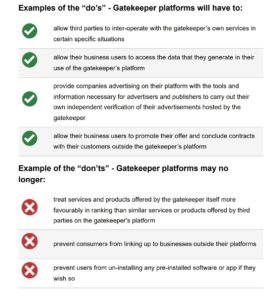Did you spot our MD, Farhad Divecha in Digiday last week? He spoke on the Digital Markets Act which, when implemented, could have a significant impact on the industry.
If you’re wondering what it is (and why you should care), the DMA is a set of regulations that aim to modulate how big companies contribute to the digital market, and stop them from abusing their power.
What does it entail?
It may affect your business, as the rules apply to all companies in practice but are tailored to mainly restrict “gatekeepers” such as Google, Meta, Microsoft, Apple and Amazon. Unlike when GDPR was introduced, this is aimed at businesses with market caps equal to or above €75 billion. This is far below the market cap of the “Big Five”, and will help to control their unfair practices.
In Digiday’s latest article about the DMA, Farhad Divecha commented “It’s a progression. It appears to be much more broad-based regulation in terms of the impact specifically on the tech giants than what we’ve seen so far.”
The DMA is predicted to arrive in October, but we can expect a draft by the end of the month. The image below is from the European Commission and explains roughly what the DMA entails.
What does it mean for marketeers?

Digiday suggests that “the DMA could be a headache for any marketer bereft of a diversified media plan or data strategies beyond the largest platforms. They will have to learn how to deal with more silos, making an already complex job even more complicated”.
Any business using the Big Five will have to evaluate how they reach their customers through these platforms. They will not only have to consider their GDPR compliance but now will also have to adapt to any unforeseen or complicated barriers presented by this new legislation.
There is a positive note – the DMA was introduced to keep the market fair, and has the potential to facilitate the creation of new technologies that work beyond the high walled gardens imposed by the big tech platforms. Long term, it could be more sustainable for innovators and smaller businesses to build up their presence, thereby eventually giving consumers more options.
WTF is the Digital Markets Act?
About the Author
AccuraCast is a digital marketing agency focused on international growth. Founded in 2004. Specialists in generative AI engine optimization, social media marketing, search and programmatic display advertising and search engine optimisation in all major global languages to businesses worldwide. Offices in London, New York and Madrid.











